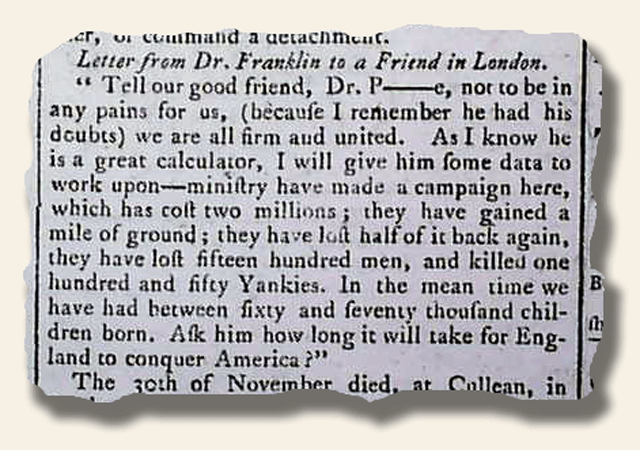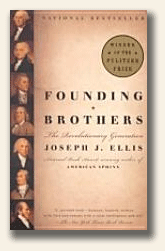A real gem…
September 16, 2010 by GuyHeilenman · Leave a Comment
In the past we’ve taken several looks at one of the inherent pleasures of the rare newspaper collecting hobby – that of finding hidden (unexpected) gems within issues. While unearthing such gems is nearly a daily occurrence for our staff, it is especially rewarding when we discover content of the significance as what we’ve shown below. The December, 1787 issue of The American Museum contains, in addition to the printing of four Federalist Papers and the ratification of the Constitution by Pennsylvania and Delaware, the full text of Benjamin Franklin’s final speech before the assembly on the last day of the Constitutional Convention. Thanks to one of our members, this treasure is no longer “lost”. As for the content… it speaks for itself. Please enjoy the wisdom of Dr. Franklin: 
Prices realized… 18th century…
September 13, 2010 by GuyHeilenman · 2 Comments
We continue with our series on “Prices Realized”. Below are a examples of actual prices paid  for a few scattered issues from the 18th century. While not the highest valued from the period, they certainly are “premium” issues. Our hope is to provide a more-comprehensive listing in the not-too-distant future. In the meantime, for what it is worth…
for a few scattered issues from the 18th century. While not the highest valued from the period, they certainly are “premium” issues. Our hope is to provide a more-comprehensive listing in the not-too-distant future. In the meantime, for what it is worth…
The Constitution of the United States… CONNECTICUT COURANT, Hartford, Oct. 1, 1787 ($17,500, 2007)
The Boston Massacre… THE ESSEX GAZETTE, Salem, Massachusetts, March 20, 1770 ($9,250, 2006)
The following is a link to our previous post in this series:
Prices realized… 16th & 17th centuries…
Prices realized… 16th & 17th centuries…
September 6, 2010 by GuyHeilenman · 5 Comments
While we’ve written several posts identifying some of the factors which impact the value of a rare and/or historic newspaper, a “price guide” showing prices realized is as of yet unavailable. Our hope would be to have such a resource accessible within the not-too-distant future. In the meantime, we’ll be taking the next few Mondays to provide some information in this regard which we hope you will find helpful.
 16th & 17th Centuries:
16th & 17th Centuries:
One of the earliest issues you will find… ZEITUNGEN, AUS WELSCHLANDEN, 1546 ($1,752, 2007)
Finding authentic newspapers from this period (16th and 17th centuries) is becoming exceedingly difficult. As a result, what would these same issues be valued at today? What impact did the condition, displayability, content, proximity (date and location to the content), rarity, etc. have on each? While these factors, and more, impact the valuation of an issue, the above examples are what they are – prices realized.
Note: Many price guides (in other collectible areas) show highly inflated prices. This enables resellers to offer items at slightly under “established” prices, giving buyers the illusion that they are getting a bargain. However, the truth is, the value of an item is really the price that others are actually willing to pay – not what a catalog/price guide lists. In the field of Rare Newspapers, our approach will always be to base prices on hard data – the track record of previous sales. Additionally, at Rare Newspapers, we try to set prices at a point where both resellers and individual collectors are comfortable. As a result, we do not have a two-tier system (one price for resellers, and another for collectors). We believe this policy provides a degree of integrity within the collectible community. We hope you agree.
A carefully worded conclusion…
August 21, 2010 by TimHughes · Leave a Comment
This item was published in the June 6, 1771 issue of the “London Chronicle“, but was taken from the Boston Evening-Post. It’s a comical piece which could have come from a modern-day situation comedy. As always, its the style of writing which adds to the article’s appeal.
Ben Franklin displays his wit…
August 14, 2010 by TimHughes · Leave a Comment
The December 11, 1775 issue of the “Hampshire Chronicle” from Southampton, England, includes a witty note from Ben Franklin to a friend in London, which appeared in several newspapers of the day. By his mind, the Revolutionary War was not going to be won by England through attrition.
Featured website: www.earlyamerica.com
August 5, 2010 by GuyHeilenman · 2 Comments
 As collectors of historic newspapers, we are always on the lookout for websites which blend history with early newspaper reporting. One such site is Archiving Early America. It describes itself as follows:
As collectors of historic newspapers, we are always on the lookout for websites which blend history with early newspaper reporting. One such site is Archiving Early America. It describes itself as follows:
Archiving Early America
Your Window To Early America
Here at Archiving Early America, you will discover a wealth of resources — a unique array of primary source material from 18th Century America. Scenes and portraits from original newspapers, maps, writings come to life on your screen just as they appeared to this country’s forebears more than two centuries ago.
As you browse through these pages, you will find it easier to understand the people, places and events of this significant time in the American experience.
We particularly appreciate Pages From The Past, which provides examples of various historic newspapers. Although not directly related to newspapers, their digit library is also worthy of mention. Enjoy.
The first newspapers in Mississippi…
July 8, 2010 by TimHughes · 1 Comment
 Even before the Mississippi Territory was made whole in 1804 (or nearly so; a small portion was annexed in 1812), a printing press was moved into Natchez at the request of the newly appointed governor in order to: “…diffuse a knowledge of the laws and other useful matters…”. Documentation gives evidence that Benjamin Stokes: “…commenced in Natchez, and continued some time, the ‘Mississippi Gazette’…This was some time in the summer of 1799, but he soon failed…”. But the earliest issue located is dated Oct. 13, 1801, vol. 2, no. 7, which would carry the date of establishment back to September, 1800. At the time the population of the entire Mississippi Territory was just 7600. The paper was discontinued on Dec. 1, 1801.
Even before the Mississippi Territory was made whole in 1804 (or nearly so; a small portion was annexed in 1812), a printing press was moved into Natchez at the request of the newly appointed governor in order to: “…diffuse a knowledge of the laws and other useful matters…”. Documentation gives evidence that Benjamin Stokes: “…commenced in Natchez, and continued some time, the ‘Mississippi Gazette’…This was some time in the summer of 1799, but he soon failed…”. But the earliest issue located is dated Oct. 13, 1801, vol. 2, no. 7, which would carry the date of establishment back to September, 1800. At the time the population of the entire Mississippi Territory was just 7600. The paper was discontinued on Dec. 1, 1801.
Another title, the “Intelligencer“, begin in Natchez on Aug. 11, 1801 judging from the date of the earliest issue located. This publication failed to last through the year, ending publication on Dec. 8, 1801. The next several papers also published in Natchez, with the “Mississippi Herald” beginning July 27, 1802 (ended in 1807); the “Constitutional Conservator” beginning in Oct., 1802 but only one issue has been located, that of April 16, 1803; the “Mississippi Messenger” beginning Sept. 7, 1804 (ended in 1808) and the “Natchez “Gazette” beginning on Jan. 7, 1808 (ended on Nov. 16, 1808).
Each of these titles, and others from the early period of the 19th century, were established before statehood was granted in 1817.
First newspapers in Michigan…
June 28, 2010 by TimHughes · Leave a Comment
 The first settlement in present-day Michigan was in Sault Ste. Mari in 1668, yet it was about one hundred years later before the first printing press arrived in the territory. Detroit was founded in 1701 and it was here in 1809 when the Rev. Father Gabriel Richard brought with him a printing press upon which Jame M. Miller, a printer from Utica, New York, would published the first issue of “Michigan Essay; Or, The Impartial Observer” on August 31. A portion of the issue was printed in French. Only four issues of this newspaper have survived and they are all the first issue so it is possible it may have been also the last.
The first settlement in present-day Michigan was in Sault Ste. Mari in 1668, yet it was about one hundred years later before the first printing press arrived in the territory. Detroit was founded in 1701 and it was here in 1809 when the Rev. Father Gabriel Richard brought with him a printing press upon which Jame M. Miller, a printer from Utica, New York, would published the first issue of “Michigan Essay; Or, The Impartial Observer” on August 31. A portion of the issue was printed in French. Only four issues of this newspaper have survived and they are all the first issue so it is possible it may have been also the last.
The second newspaper in Michigan was also in Detroit, the “Detroit Gazette” which began on July 25, 1817. Three of the pages were in English while one was in French. It succeeded for about thirteen years, expiring on April 22, 1830. The third newspaper was again in Detroit, the “Michigan Herald“, which began in 1825 and lasted for four years. the first French newspaper in Michigan was the “Gazette Francaise, which also began in 1825, which was also the year the first newspaper outside of Detroit was begun, being the “Michigan Sentinel” in the town of Monroe. By the 1830’s newspapers in the Michigan Territory became more commonplace.
Recommended reading…
June 26, 2010 by GuyHeilenman · Leave a Comment
 Jim Wheeler, one of our “rare newspaper” friends, recently sent us an e-mail with the following recommendation for our summer reading list:
Jim Wheeler, one of our “rare newspaper” friends, recently sent us an e-mail with the following recommendation for our summer reading list:
The Constitutional Convention: A Narrative History from the Notes of James Madison, by Edward J. Larson & Michael P. Winship, ISBN 0-8129-7517
This book essentially condenses and annotates Madison’s notes taken throughout the Convention so that the language and the important concepts that were discussed can be understood today. The book includes a list of those attending the convention and their respective states. When you keep a  copy of this list handy while reading the notes, you can get a clear picture of the regional motives behind the discussion as the constitution was developed. This book, in conjunction with The Founding Brothers, John Ellis, were both extremely helpful in developing a working understanding of what I consider to be one of the most interesting 10 to 20 year time period in US history.
copy of this list handy while reading the notes, you can get a clear picture of the regional motives behind the discussion as the constitution was developed. This book, in conjunction with The Founding Brothers, John Ellis, were both extremely helpful in developing a working understanding of what I consider to be one of the most interesting 10 to 20 year time period in US history.
I thought that in addition to all of your other reading, these two items may be interesting and helpful.
Thanks for your suggestions Jim. To the readers of this post: “If you have a chance to read either of these (or have already done so), the community would love to hear your reactions as well.
Rules for mourning…
June 19, 2010 by TimHughes · Leave a Comment
The “Sentimental & Masonic Magazine” from Dublin, Ireland, July, 1792, has an interesting article headed: “General rules for Behaving in Mourning”. It may have been written partially tongue-in-cheek, but you can decide.




